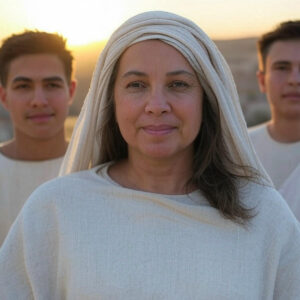The great artist Doré created a dark and gruesome etching of her. Kendall and Tennyson wrote poems named after her. And William Cullen Bryant penned the following about her:
poems named after her. And William Cullen Bryant penned the following about her:
Hear what the desolate Rizpah said,
As on Gibeah’s rocks she watched the dead.
The sons of Michal before her lay,
And her own fair children, dearer than they;
By a death of shame they all had died,
And were stretched on the bare rock, side by side.
Such is the bazaar and fascinating account of Rizpah, the mother who guarded the dead.
It began in the courts of King Saul where Rizpah was chosen to be a concubine. Here she lived in lavishness and bore two sons, Armoni and Mephibosheth (not to be confused with Jonathan’s son). Yet her joy would come to an abrupt end when she and her family became pawns in the game of politics and vengeance.
A treaty had been made with the Gibeonites promising that Israel would not pursue them. Yet Saul broke that treaty and set out to destroy them. After Saul’s death and David’s rise to power, a severe famine struck the land. David learned that the famine was the result of Saul’s false dealing with the Gibeonites. As restitution, the Gibeonites insisted on taking the lives of seven of Saul’s sons. David agreed to the hanging of five of Saul’s grandsons and both sons of Rizpah.
The bodies of these men hung and decayed on the hilltop as mournful Rizpah kept watch. Day and night she sat in sackcloth and protected the corpses from being ravaged by the vultures and wild animals. Her torment must have been unbearable, yet it was not as great as the love she had for her children. For six months the vigil continued; then the rains came and she sensed relief sent from God on the cursed land.
Soon afterward, David was told of Rizpah’s vigil. “David brought the bones of Saul and his son Jonathan from there, and the bones of those who had been killed and exposed were gathered up” (21:13). The bodies were finally laid to rest.
Rizpah had six months to meditate on her awful plight. What were her thoughts? Did she feel anger over the senseless vengeance taken out on her sons all because of a situation she could not prevent? Did she feel hatred toward God who could have stopped this senseless killing? Did she feel the loneliness that comes from a family destroyed? No doubt she felt all of those. They were all thoughts that were rooted in the love and concern she had for her children. The pain that she endured was something few can imagine. Only those who have lost a child can begin to appreciate the torture of Rizpah. We can sense this same sorrow in David upon Absalom’s death, in the widow from Nain who lost her only son, in the Shunammite woman whose boy died in her lap, and in Mary who watched her son brutally tortured and crucified.
The similarities between Rizpah and Mary are striking. Both mothers mourned the deaths of their innocent sons. Both mothers sat on a hillside and looked up as their sons’ bodies hung on a tree of death. Both mothers kept vigil at the place where their sons died. Both mothers knew the death of their sons was payment, one for a promise broken, the other for a promise kept. Yet there was one significant difference between them. Rizpah’s sons remained in the family grave at Zela. Mary’s son rose from the grave in glory.
He lives and grants me daily breath;
He lives and I shall conquer death;
He lives my mansion to prepare;
He lives to bring me safely there.
(from “I Know that My Redeemer Lives”)
